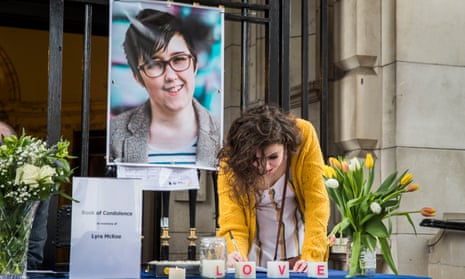The killing of Lyra McKee is a devastating loss for Northern Ireland and for all those who value integrity and thought. I knew her through her work, which was exceptional; everything I’ve read about her since the shooting has made me wish we had met.
I am shaken by her killing, but I am not surprised that such a horrific thing happened. Northern Ireland, overall, is a much better place than it was 21 years ago when the Good Friday agreement was signed. However, for some, it is not that there may be a return to the Troubles, but that the Troubles have never ended. Others forget the concept of the “peace process” in favour of simplistic narratives which insist that Northern Ireland is either at peace or at war, when the reality is more nuanced.
McKee was shot during a riot in Creggan which took place after police raids on housing estates. It’s a community I know well, having spent five years making a documentary there. In 2012 I interviewed a Derry woman, Majella, who had brought her teenage son, Philly, to be shot in the legs after he had been accused of drug-dealing. Majella, her son and his shooters are all dissident Republicans. They regard the Good Friday agreement as a surrender. They don’t recognise the police, the courts or the UK government. Everyone knows who shot Philly. Nobody will cooperate with the police. Nobody has been charged. People will know who shot Lyra McKee. The likelihood is that they won’t cooperate either.
I saw how locals approached New IRA members with their problems and filmed an armed patrol at night. Meanwhile, community activists mediated between transgressors and gunmen. Punishments ranged from beatings to shootings and banishments.
Dissident Republicans certainly do not represent all of Derry, which has made incredible progress given what happened there during the Troubles. Many of my friends from Derry have little knowledge or relationship with this community, which is mostly in areas such as Rosemount or Creggan, estates that are relatively isolated.
The intensity of engagement also varies significantly within the dissident Republican community itself. Politicians who identify as dissident Republicans were elected in three wards in the last local elections in 2014 with thousands of votes.
While I filmed in this community, I realised how difficult it is for wars to end. Along the way I got to know Philly’s little brother, Kevin Barry, who was 11 when we first met. Funny, a performer, menacing and vulnerable, he embodies some of the complexities of this community. During our last interview, Kevin told me that people his age wanted the Troubles back: ‘The madness, the riots, the shootings, the bombings, everything.”
It’s an extraordinary statement, not least because he doesn’t remember the Troubles. They were over by the time he was born. They do, however, evoke a time of heroism and purpose for him and his friends in a society that is rife with unemployment, drug abuse, bullying and corruption. Symptoms akin to post-traumatic stress disorder are widespread. The effects are passed on to younger generations.
Many people I met were so used to conflict they were almost seeking it out. A pub row or a dispute over a broken wing mirror could end in a shooting. There is a constant sense of oppression from the outside, compounded by events such as the recent decision to prosecute a single British soldier for Bloody Sunday, rather than investigate those who had given the orders.
It’s not just the dissident Republican community that feels events are unresolved. More people have taken their own lives in Northern Ireland since the Good Friday agreement than were killed during the Troubles. As McKee so poignantly wrote for the Atlantic: “The spoils (of peace) just never seemed to reach us.”
A post-conflict society is messy. There are no winners. Everyone has lost. It’s nuanced and precarious and doesn’t work well for news headlines or political soundbites. However, this is exactly where Northern Ireland has found itself in recent times, in a row between politicians, the stumbling block to Theresa May’s Brexit deal, and the UK’s departure from the EU. As local councillor and another of the film’s participants, Darren O’Reilly, told me: “Nobody is paying attention until it suits them.”
It seems also as if the increased scrutiny over the backstop has energised the dissident Republican community and served as a recruitment tool. Since the start of February, dissident Republicans have shot four men “by appointment”. They claimed responsibility last month for three “suspicious” devices sent to UK addresses. Now the tragedy of McKee’s killing.
We’ve all been forced to review our understanding of news and facts in recent times. Brexit too has exposed the danger of spin, the failure of “black and white” narratives. The Northern Ireland issue is emblematic of this tendency, and cuts across the UK’s ideological divide. In recent years it could only exist as an uncomplicated good news story, if at all. It was barely mentioned during the Brexit referendum campaign, yet Leavers were expected to accept Remainers’ newfound concerns when the backstop issue became so central.
Similarly, my film, A Mother Brings Her Son to Be Shot, has won acclaim all over the world – if you’ll allow me a little immodesty – but struggled to find support in the UK. One UK broadcaster said that Northern Ireland was a “turn-off”.
In Northern Ireland, the mainstream parties must stop seeking to make political capital of all events. They must reach out to all and govern the region in its entirety. It’s not clear what happens next for dissident Republicans. Predictably, the official line was to blame “crown forces” for the provocation but many will be ashamed by what happened.
Will that change things?
I hope so.
Sinéad O’Shea is the director of A Mother Brings Her Son to Be Shot
